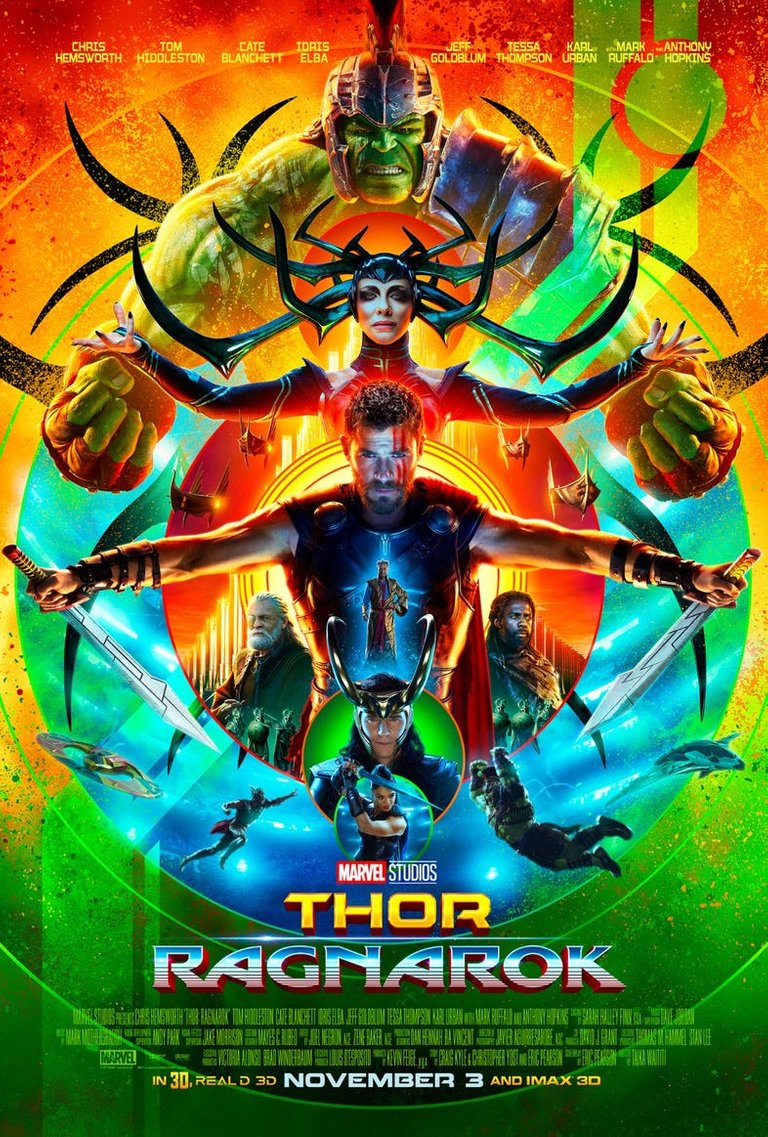
The rot of Marvel Comics has finally crept into the Marvel Cinematic Universe. Not just the rot of Social Justice -- the rot of mediocrity.
On paper the movie sounds awesome. Thor, the God of Thunder, must defend Asgard and the Nine Realms from Hela, the all-powerful Goddess of Death. However, he is stranded on the planet of Sakaar on the other side of the galaxy. Surviving a brutal gladiatorial arena, Thor gathers allies and makes his way home to prevent Ragnarok, the prophesized destruction of Asgard.
In execution, it was as stale as week-old popcorn. With a basic plot, forgettable dialogue and limp characters, I struggled to remain engaged with the movie, much less care about the story. The heart of the problem lies with the movie's poor craftsmanship and its rejection of the mythic.
(Spoilers ahead!)
Failed First Impressions
The story begins with Thor bound in chains and swinging gently from the roof of a dungeon. There he encounters Surter the fire giant. Surter, wreathed in flames and as massive as a mountain, reveals that Thor's brother Loki has been impersonating Odin, and vows to destroy Asgard on the day of Ragnarok when his crown is reunited with the Eternal Flame that burns beneath Asgard. Surter's speech is a powerful moment, establishing Surter as a creature of unbounded malice and cruelty, capable of restraining even the mighty Thor...
...A moment Thor ruins by interrupting Surter. Twice.
Not by smashing the giant in the face with Mjolnir. But by asking Surter to pause his speech for a moment, when Thor spins away from Surter. Twice.
This break is dead time. Thor doesn't declare defiance, stall for time to summon his mighty hammer, or break his chains. He just drops a couple of lame remarks--and Surter politely obliges him by waiting until Thor faces him again before continuing.
The interruptions force humor where humor is unwarranted, breaking off an emotional build-up for a payoff of eye-rolls and cringes and sighs. We see the same pattern over and over again.
Returning to Asgard, Thor sees a massive, gaudy statue of Loki and goes to find his brother. Loki, disguised as Odin, is watching a play that allegedly recreates the final moments of the war against the Dark Elves. It has the actor portraying Loki making a dramatic speech to Thor, showing his innate nobility and patriotism with his dying breath--and then asking for a statue made of gold. With a helmet. And horns.
The lines are absolutely cringeworthy -- but everyone applauds, hailing it as a masterpiece.
This is absurd. The play could have been a masterpiece of propaganda, depicting Loki as making a final sacrifice, and declaring that he had always been a loyal son of Asgard, and leaving it at that. That would have inspired applause. Not the eye-rollingly awful lines about the statue.
But those lines about the statue were deliberate, referencing the statue seen earlier. This is the filmmakers saying, "I know you were wondering why there's a stature of a traitor. Here's why -- and we'll hammer the point home so even you can get it!"
By telling exactly how and why something in-story was made and justified, the filmmakers are treating the audience like idiots who can't put two and two together in the service of making even more lame jokes.
Later on, when Scrapper 142 is introduced, the scene begins swimmingly. The ramp of her spaceship lowers, revealing a lean, muscular woman taking a swig from a bottle. She's a hard-drinking, no-nonsense hands-on woman, who isn't about to let a bunch of bottom-feeding scum get between her and her prey. She descends the ramp, steeling for a fight--
And falls off.
She drank so much she couldn't even walk straight. But she manages to control a pair of machine guns and blow away the enemy--without shooting herself by accident. And while she continues to imbibe liquor by the barrel, she is miraculously cured of all alcohol-inflicted problems. It becomes clear that Scrapper's initial introduction was designed to force a joke when there was no opportunity for one, sapping the scene of its emotional power.
The filmmakers repeat this pattern of build-up and interruptions, again and again subverting the audience's expectations for a pay-off in favor of a lame gotcha moment that says, "We know you were expecting something awesome, so enjoy this lame duck!"
Contrast this pattern with this scene from Cowboy Bebop:
In this scene, Faye Valentine is introduced to the series. We see her sauntering in, oozing sex appeal, ready to use her charms on the store keeper. But the conversation is interrupted. When the gunmen appear, she spots them coming, and coolly breaks out her submachine gun and opens fire. These shots establish the image of the femme fatale.
Then we see the truth. Despite the barrage of gunfire she doesn't actually hit any of the bad guys. When they drive up with their Gatling gun, she has no response. And in the face of overwhelming firepower, she surrenders. This reveals the truth: she is a poser.
This sequence works because every scene is allowed to play out to the end, with logical if unexpected consequences. The audience has time to build their first impression, that she is a femme fatale. They see the criminals coming, setting up an expectation for a gunfight. In an action-heavy series like Cowboy Bebop the audience would expect a setpiece battle. Faye's capture comes out of the blue. However, this moment feels like a mask being peeled off to reveal the true character underneath, because every scene flows organically to the next without pauses to wink at the audience. There are no stupid breaks to force humor into a deadly serious moment, allowing the final moment with Faye's expression to serve as a sharp juxtaposition to the rest of the sequence and create a moment of levity.
These failed first impressions are but a harbinger of worse things yet.
Not Quite Gods
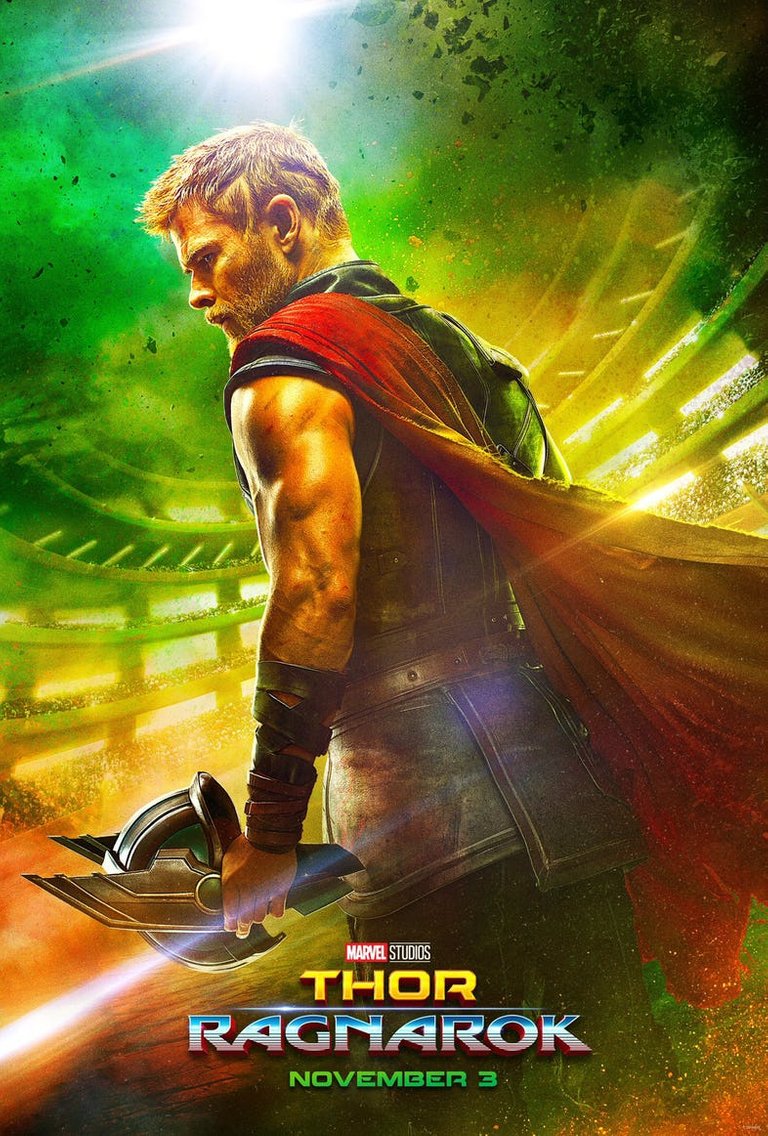
Ancient polytheistic religions, including the Old Norse religion, tend to portray the gods as extraordinarily powerful individuals who are nonetheless deeply flawed. They are magnifications of mortal quirks and foibles: strength and cowardice, love and lust, rage and fear. Thor, God of Thunder, the Protector of Mankind, slayer of giants and monsters, is not exempt.
The difference between a man with superpowers and a pagan god is magnitude. A man may dine well every day; the Thor of myth feasts on two whole oxen every night, then resurrects them from their bones with the power of Mjolner. A man who can lift four hundred pounds is incredibly strong; Thor is so strong he lifts the paw of a cat -- the world-serpent Jormungandr in disguise. A man may drink heartily; Thor drank from the ocean and created the tides.
The Thor of Thor: Ragnarok is no god. He has human-sized strengths and flaws, and fails to overcome them. His feats are human-sized, and so are most of the enemies he faces. Nothing he does marks him as divine, or even as a worthy heir to the throne of Asgard.
When Thor converses with Dr Strange, Dr Strange easily discombobulates Thor with his magic -- thus implying that Thor is weaker than a mere man. On Sakaar, Thor is immediately subdued by a small obedience disc -- which uses electricity, the element he allegedly controls, to shock its victim into submission. Later, when Thor puts his team together, he delivers no inspiring speeches and displays no leadership: everybody is simply coming along for the ride, because reasons. After learning of Scrapper's true identity, instead of pressing her into service as the sovereign of his realm, Thor delivers more cringe-worthy politically correct statements admiring her for being a Valkyrie and stating that having Strong Action Females is Perfectly Okay. Throughout the movie, Thor empowers no humans, demonstrates no feats worthy of a god, rules over nothing, and overcomes no impossible odds.
The Thor of the movie is barely a man who possesses some superpowers, not a being hailed as a god.
And the other heroes aren't much better.
On Sakaar, the Hulk is hailed as the hero of the gladiatorial games, and constantly acts like a powerful but petulant child. It turns out Bruce Banner has been the Hulk for two years -- and he only returns to a human after seeing a video of the Black Widow calming him down. Bruce Banner quickly becomes a quivering nervous wreck who needs to be constantly soothed and shielded from anything that remotely reminds him of the Hulk, and is afraid that if he becomes the Hulk again he can't come back. This is a far cry from the Bruce Banner of lore, who revealed his supreme self-control by turning into the Hulk on a moment's notice by declaring "I'm always angry" -- and always coming back.
Scrapper, in turn, is a Valkyrie trying to run from her past. After Hela slaughtered the Valkyries in the backstory, Scrapper fled to Sakaar and tried to live a new life. Par the course for Hollywood-issue Strong Action Females, she displays the usual contempt towards all male characters in the movie, and the men display the expected slavish admiration of her. Thor wants her on the job anyway, and she rejects him.
By the fiat of the almighty script, they join up anyway. Bruce Banner miraculously recovers and chooses to become the Hulk to fight giant monsters, because reasons. Loki forces Scrapper to relive her past, which makes her decide to return to Asgard to fight the goddess who killed her friends, because reasons. In both instances there were opportunities for Thor to demonstrate his divinity, help these characters overcome their trauma and help them become more than they were -- but the movie squanders them in favor of portraying a formerly-collected Bruce Banner as a gibbering lunatic and Scrapper as a Strong Independent Action Woman.
Thor in Thor: Ragnarok is neither god nor hero; he is simply the protagonist because the plot said so, displaying neither leadership nor divinity. He has been reduced from a god to a shadow of a superman.
So-Called Villains
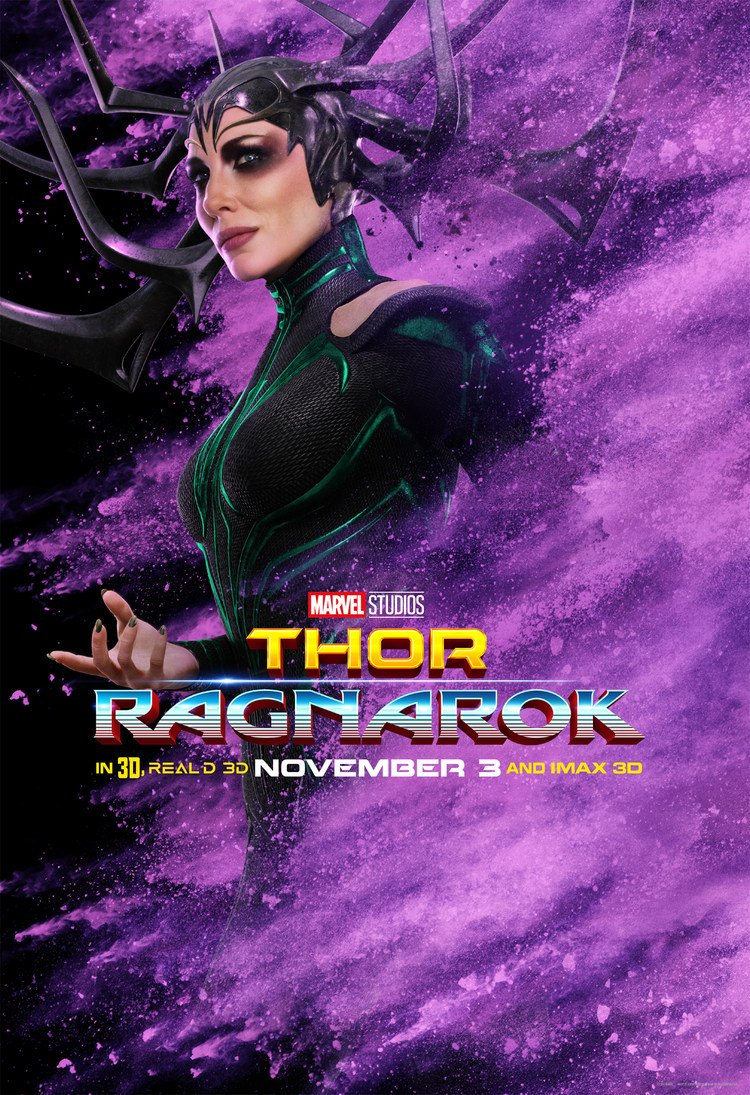
Every superhero story needs supervillains. None in this movie fit the bill.
When Odin passes on, Hela escapes from her prison by the simple expedient of opening a portal to Earth a few minutes later. Why she didn't do this earlier isn't explained; she simply shows up out of thin air. After beating Loki and Odin, she returns to Asgard to establish her rule. The armies of Asgard objects, so she slays them all single-handedly without breaking a sweat.
Up to this point there is nothing special about her. Hela may be the Goddess of Death, but she displays no powers that display her command of death. Her action scenes are no different from a generic Dark Action Girl fighting off hordes of good guy mooks with melee weapons. When she resurrects her army, she doesn't open a doorway from Hel to let them march forth; she uses the Eternal Flame, hinting at its true purpose.
There is nothing terrifying about Hela, nothing that demonstrates she has supernatural control over death, nothing that presents her as anything more than a daughter angry at her father and taking revenge by conquering the Nine Realms. There is nothing about Hela that shows she is a goddess. Like Thor, she is no god, only a woman with some measure of superstrength.
The second antagonist is the Grandmaster, supreme ruler of Sakaar. He organizes the gladiatorial games and rewards people who bring in fresh meat, and... little else.
His screen presence is completely flat. He executes no plots against his enemies, he displays no political sense, and his most notable trait is his insistence on seeking the right words. He is just...there, a minor character with little impact on the story. He poses no threat to the heroes at all, not even indirectly by organizing an efficient crackdown (as opposed to the disorganized ragtag affair we see in the movie) or disposing of the rebels before they become a threat. Between the flatness of his character and the lack of character development from the main cast, the entire Sakaar plotline feels like a distraction.
Special mention must be made of Skurge. When he is introduced, the audience sees him hamming it up with a pair of M16s, trying and failing to impress two women. He's too shallow and self-absorbed to graduate to the ranks of sleazy wannabe pick-up artists, much less to play the part of a true Cassanova. When Hela invades Asgard, he is the first to bend the knee.
And for most of the movie, he does...nothing.
Skurge accompanies Hela in her scenes, mostly so she has an audience for her monologues. He doesn't even say anything of note. Hela rewards his dedication by making him her executioner -- not simply the man who kills her enemies, but the man who executes her will. His promotion further undercuts Hela's image: by promoting Skurge, who at this point is little more than a worthless hanger-on, to such an important role, she shows that she has no idea how to pick subordinates. She is no evil goddess, just an idiot.
As executioner, Skurge prepares to execute all of one civilian when he is stopped. That is the extent of his on-screen service for Hela. Later, Skurge grabs his guns and turns on Hela's armies. Because...reasons.
If this is supposed to be a redemption scene, I'm not buying it. Skurge simply hasn't done anything truly evil. The audience did not see him murdering, raping, looting or pillaging anyone. The closest he got was almost but not actually executing an innocent person. While he acted like a blowhard early on, that is the extent of his sins. He has little to atone for, so his redemption moment falls flat.
If the supervillains fail to be super or villains, they have no place in a superhero story.
Just Another Non-Apocalypse
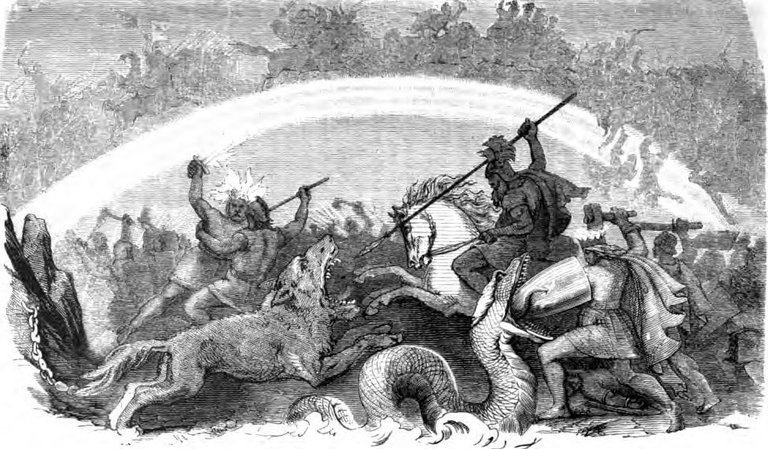
(Battle of the Doomed Gods, Friedrich Wilhelm Heine, public domain, first sourced from Wikipedia)
Ragnarok is the most terrifying time in Norse myth. A terrible winter descends upon the world, with starvation and madness in its wake. Brother turns on brother, family ties sunder, oaths are broken, and vice overruns the land. It is the age of the sword and the axe, the age of the wind and the wolf, the age of madness and disdain.
Yggdrasil shudders. The giants march forth to make war on the gods, Hyrm from the east with his shield and Sutr from the South with a blazing sword, laying waste to everything. Jormungandr writhes, sending mighty waves crashing ashore. Naglfar, filled with the hordes of the dead, lands on Midgard to disgorge its dreadful army, with Loki leading them. Fenrir breaks his bonds rampages across the world and devours the sun.
The gods go forth to battle the invaders, and die. The einherjar ride to meet the monsters and foemen, and all fall in battle. Fenrir swallows Odin whole. Thor slays Jormungandr, but succumbs to its poison. Sutr kills Freyr. Tyr and Garmr kill each other in mutual combat. The earth sinks into the seas, the stars vanish and flames rise into the heavens. The gods die, humans die, all die.
Compared to this Ragnarok, the movie falls flat.
There are no betrayals, no unnatural weather, no rise of the giants, no epic moments by gods or men. There is a Fenrir and there is an undead army, but otherwise there are no similarities to the original Ragnarok. Worse yet, the movie highlights no virtue.
Ragnarok is the grim collision of destiny and duty. The gods know they will die, and how they will die, and no matter what they do they cannot change fate. But they will fight the invaders regardless. In the movie, though the characters from Asgard know Ragnarok is upon them, there is no sense of fatalism or duty, not even an acknowledgement that their world is ending. Odin does not die at the head of a divine army; he just disintegrates because reasons. The closest the movie comes to acknowledging duty is to have Thor appeal to Scrapper's sense of duty -- and fail. A blatant disregard of Norse values, or indeed, the values of any civilisation worth living in.
The closes the movie comes to tapping the mythic is by having Thor lose an eye in the final fight against Hela -- and even that is only to create some superficial similarity to Odin, and to have Thor pull a last-minute power up. This is a pale shadow of Norse myth.
Sacrifice and equivalent exchange run through Norse culture. Odin sacrificed his eye to drink from the well of Urd, gaining the knowledge of the cosmos. Tyr sacrificed his right hand to bind Fenrir, buying safety from the wolf until the end of the age. Thor makes no such sacrifice -- his losing an eye was no deliberate choice, but merely the fortunes of war. No equivalent exchange occurs, no price was willingly paid, but something was gained anyway.
Above all else, Ragnarok isn't merely the end of the world. It is the end of an age -- and the beginning of another. After the death of the Aesir and the destruction of Asgard, the world will recover from the cataclysm, Lif and Lifpraser shall repopulate the world, and a new pantheon of gods shall emerge. There is hope for a new world, a new beginning, a new age.
The movie offers nothing. Hela draws her power from Asgard, so to destroy her the heroes decide to destroy Asgard. They resurrect Surter, who fulfills the prophecy by destroying the entire planet. With himself still on it. (Because, well, reasons.) This Ragnarok is not the end of a cycle; it is simply an end. A great, terrible tragedy that the filmmakers just had to ruin with an unfunny 'joke'.
Thor: Ragnarok acknowledges no morals and celebrates no virtues, it elevates no gods and eschews the epic, it sacrifices the mythic in exchange for lame winks at the audience. If this is the future of the Marvel Cinematic Universe, I want no more of it.
--
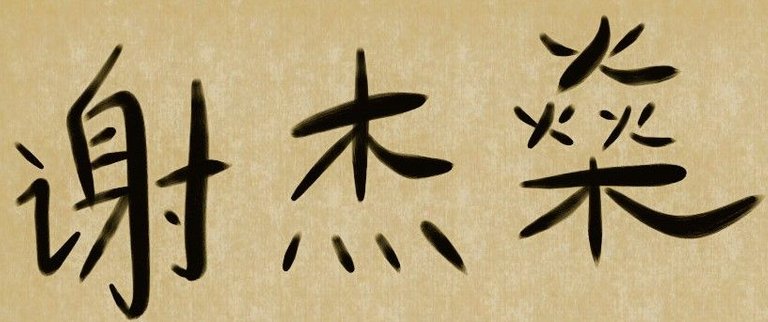
if you'd like a modern story that captures the mythic, check out my Dragon Award nominated novel NO GODS, ONLY DAIMONS, featuring heroes that act like heroes, angels that act like angels, and demons that act like demons.
Great to read this as I am far from being a fan of stale popcorn. you know, having 2 post-doctorates in Popcornology makes me a bit of a snob on that level... ;)
Great article, thanks for sharing the heads-up, namaste :)
Thanks!
Congratulations @cheah! You have completed some achievement on Steemit and have been rewarded with new badge(s) :
Click on any badge to view your own Board of Honor on SteemitBoard.
For more information about SteemitBoard, click here
If you no longer want to receive notifications, reply to this comment with the word
STOPnyc story and the pictures are really effective keep it up
Thanks.
yea ...you are definatly right ....if this how they gioing to do things ...no more ...and your post just outstanding ...its very informative and your review also is awsome ...
i wanna follow you ..and upvoted😘 ....are you an anime fan????
Thanks!
I do enjoy anime, but these days I haven't had much time for it. Perhaps someday soon...
Nice post thanks for sharing
click here.Congratulations @cheah, this post is the eighth most rewarded post (based on pending payouts) in the last 12 hours written by a Superuser account holder (accounts that hold between 1 and 10 Mega Vests). The total number of posts by Superuser account holders during this period was 592 and the total pending payments to posts in this category was $3032.77. To see the full list of highest paid posts across all accounts categories,
If you do not wish to receive these messages in future, please reply stop to this comment.
That's a nice post to read, I just finished watching it and despite some good one-liners it really didn't have any mass. Although Hella vs the Askardians might me think of of the Madara vs Shinobi Alliance fight xD. It really missed every good opportunity for delivering some good eye candy but that's what you get when amateurs get to learn with a 100million $ project....
And f..k that ending... Sry...
Thanks. The movie is so utterly forgettable I can't remember anything from it that stood out. In a positive way, that is. But that's what you get when movies are churned out like mass manufactured products off an assembly line.
Yess it's seems to me that they've tried to crunch two movies into one, or two storylines bceause they didn't think a thor 4 was possible but because this one is publicly seen as the best one so far it might be and now they've used two of the best storylines from thor and hulk and made it unusable just a Hella who as character I really enjoyed when she was on screen
This is a awesome analysis. My only comment is to recommend it to anyone interested in anything you touch on here. 😎
Thanks. Yeah, I promote my posts to people I know who are interested in this sort of thing.
I think you had way too many expectations about this film. It is about a superhero take on the Norse myths. Who told you it was supposed to be an accurate representation of the legends? The previous films including Thor should be a hint to what directions the film would not take.
As for Cowboy Beebop-it it a series. The writers have time to fully flesh out a character in detail. Movies like this generally don't and you have to take into account that not everyone is familiar with Norse legend. That said this is a super hero action movie, not a retelling of the myth. The movies goal is to tell an entertaining story and make a profit.
I personally think the movie was used as a lesson of you can't run from your past, eventually you have to face it. And that is what happens. Odin's past comes back to haunt everyone.
Stylistically, all the sets have a purpose and express that purpose, from the roof murals to the catacombs. Odin tried to cover up and bury his past...it didn't work.
The studio made a movie about facing the past and meeting a new future...in average movie screening time.
If I want an accurate depiction of Norse mythology, i will reread the legends.
I think you missed the point of this article.
Thor: Ragnarok is an MCU film. I went in with no expectations beyond a reasonable return on my entertainment dollar. Which it didn't provide.
Thor: Ragnarok tried too hard to be another Guardians of the Galaxy instead of doing its own thing. The forced jokes killed the pacing at critical moments and the visuals did little for me. The story was bland, the characters insipid and the action scenes were generic.
I brought up Cowboy Bebop to demonstrate how, in the space of 89 seconds, a storyteller can set up a false impression of a character and convincingly peel it away to reveal a more complex persona. Thor: Ragnarok tried to do something similar, but failed. Over and over and over again.
Thor: Ragnarok tries to be a superhero film. But it's not. To have a superhero film, you need superheroes. A superhero isn't some random guy with superpowers; a superhero is a hero who happens to have superpowers. Superhero films need a moral core, and Thor: Ragnarok doesn't have one. Likewise, Thor is hailed as a 'god' throughout the movie, but he isn't portrayed as one -- just as a random guy with some powers. I brought up the Norse myths specifically to highlight the nature of pagan gods and virtues, contrasting them against the lack of the same in the movie. There are neither superheroes nor gods here, just plain boring people who happen to have powers.
Thor: Ragnarok is shallow and forgettable. I don't care if Marvel wants to do its own spin on Norse myth, but if it can't produce a movie that even my normie fiance can enjoy, much less myself, I'm not going to watch any more MCU films.